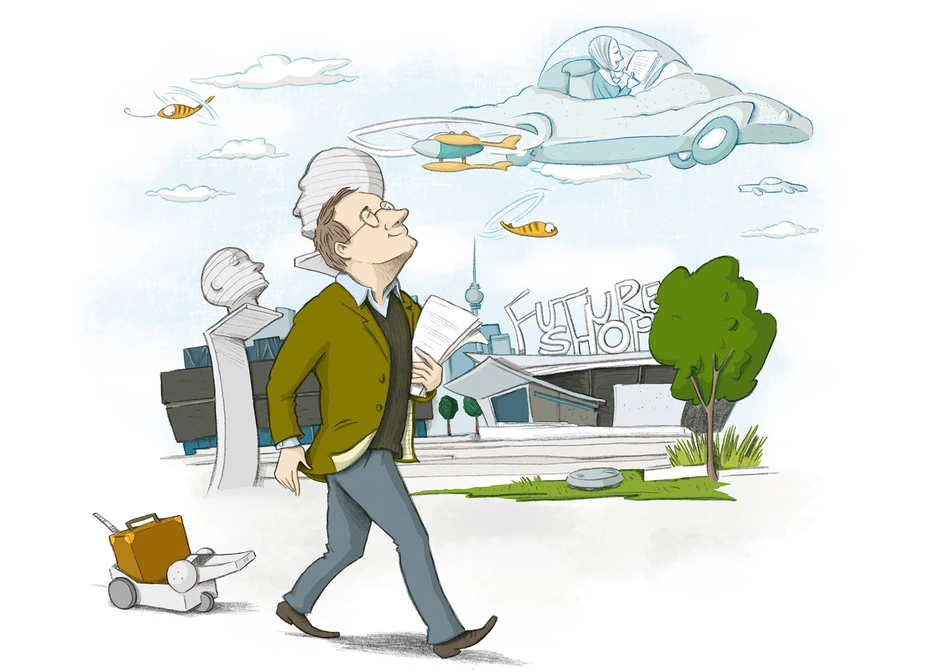Washing Gold in Adlershof
A Day in the Life of a Science Manager
On my way to the office, I stop in one of Adlershof’s residential areas for a short stroll. The fresh morning air and the sight of the many flowers in passing gardens also lets my mind wander. One of Europe’s largest high-tech locations is just a stone’s throw away. I wonder if the people in the neighbourhood are interested in innovative technology? Is there anything fundamentally new they are looking forward to? I guess, I might have a rough idea of what they’re interested in. I’m one of them, after all. The autonomous car, electric cars. Interesting topics to debate. They are fascinating but also stir up controversy. Taking it down a notch: driver-assistance systems. I remember the short step from “don’t need them” to “can’t live without them”. Now people are expecting more and more. Moving away from every-day life: drones. People seem to think they’re laughable and scary at the same time.
I’m back at my diesel car, which I bought before the recent seismic shift in values, and I’m off to work. While parking my car, I notice that nobody had taken an electric car to work. The large screen in the lobby is welcoming a visiting group of visiting experts. Double-edged science management: first you motivate experts to work out minute details of research projects, then invite their critics. When these groups collide, sparks fly. But it’s reminiscent of washing gold in the Old West: the good that comes out of it, stays.
I hear a helicopter on my way to the cafeteria. I don’t look up. If I’d heard a UAV – an unmanned aerial vehicle - I believe I might’ve felt threatened. But I’ve never seen a UAV in Adlershof.
I must run an errand at a local company and decide to show up unannounced after my mid-day snack. As I step out of the elevator, a robocarrier approaches me but keeps its distance. I look around for his owner. Nobody there. It seems the company is confident about its autonomous systems. Without much public attention, it is developing a technology, which might become useful or visible to normal citizens someday way beyond the limits of intralogistics. To do this, scientists, managers and technicians from different areas will have to cooperate. It is worth thinking about the innovations that could arise from a conversation between developers of, say, autonomous transporting systems in warehouses and advocates of improved mobility for the physically challenged. Or: the potential of lifting autonomous mobile technology from the earth into the sky. Less remote controlling and more self-determination for civil drones, who cooperate with vehicles on the ground. These are issues which should be conceived as global by default.
We should also work on our local ties. Normal citizens are interested in small, affordable gadgets. Where are the browsing and shopping opportunities on the high-tech campus? We need an innovation store!
I’m on my way home and pass through the gardens again. Wait a minute, what was that? A robotic lawn mower? I see a multitude of little robots on the ground and in the air. Some of them are hovering over flowers. Could we replace bees with technology? I turn my car around and drive back. The robotic lawn mower is stoically and rather clumsily doing his rounds. I think I imagined most of it after all.
Alfred Iwainsky, physics professor and computer scientist, has been in Adlershof from the get-go. As a child, he visited the special class for mathematics at the Heinrich-Hertz-School on Peter-Kast-Strasse, heard his first Nobel prize winner speak at the local Bunsensaal auditorium (Gustav Hertz), dabbled in cosmos research in Adlershof and was chairman of the GfaI Society for the Advancement of Applied Computer Science. He will commence his fifth ZIM network project soon.
